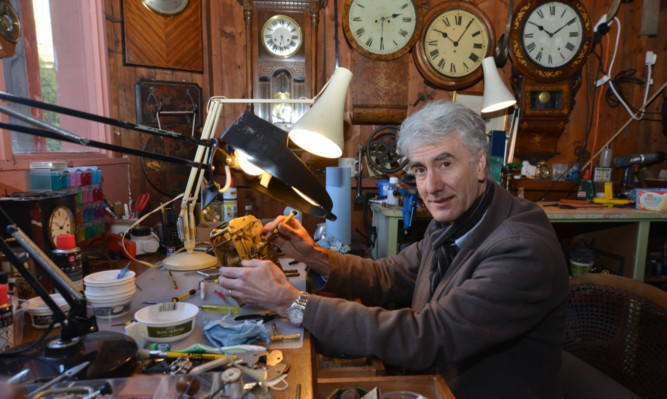Walking into Lindsay Burch’s cosy clock fixing workshop at the bottom of his garden in Newport is a bit like stepping back in time to the opening scene of the movie Back to the Future.
Clocks of all shapes and sizes crowd ramshackle shelves whilst a relaxing cacophony of ticking fills the warm air which is rich with the heady scent of wood burning on the stove and chemicals used for cleaning clock parts.
Lindsay, now 58, has been interested in clocks and how they work for more than 25 years.
But eight years after setting up his clock fixing business as a hobby, the former University of Dundee biochemist has spent the past three years doing it full time and he’s loving every minute of it!
Originally from Norfolk, Lindsay studied for his first degree at Manchester Polytechnic then came up to Aberdeen to do second and third degrees. Completing a PhD in plant biochemistry, he did his first post doctorate in Aberystwyth.
He and his wife then moved back up to Scotland in 1989 when he started working as a University of Dundee biochemist working in the department of medicine at Ninewells.
His cancer research expertise was in the P53 tumour suppression gene. “The thread that goes through my career was working on enzymes. There a lot of enzymes that modify and activate P53,”he explains.
But after commuting for two years when the lab moved to Edinburgh, then returning to Dundee where he picked up some contract work centred on diabetes statistics, he started to look into what ‘plan B’ career options he could pursue instead.
“I had been interested in clocks since we moved up in 1989/90,”Lindsay says. “My wife wanted a clock for the kitchen. We went to Taylors Auction in Montrose. When we first moved up we were buying pieces of furniture to fill the house. I bought a German mantel clock which didn’t have a pendulum! I planned to restore it. I took it to the former Cupar clock restorer Ian Balsillle and that sparked my interest.
“I took a few clocks to bits and thought ‘mmm’! And bought some books to teach myself. It was a hobby until I took early retirement at 55.”
Lindsay has lost count of how many clocks he has fixed over the years, but it’s in the hundreds.
And it’s not just traditional mantel piece or wall clocks he repairs.
Lindsay often buys old clocks for spare parts and many of the clocks in his workshop are being cannibalised for this purpose.
His precision work involves a great deal of concentration, often dealing with minute workings.
What he finds most fascinating about clocks is that the workings are all different.
“Clockmakers over the years seem to have been quite innovative,”he adds. “They always seemed to be looking at how to get ‘more bang for your buck’ as it were. How to get more complication out of what should be a simple movement. The Germans were very good at that. But in terms of quality of mechanism, probably the French movement from the 1860s to the early 1900s are the best. These were high quality with very fine steelwork. They go with just a service and will continue to go for another 100 years.”
Lindsay’s favourites are the weight-driven Vienna Regulators with their porcelain dials and long pendulum. He finds them very visually appealing.
But for many of his customers the make and style of the clock is unimportant.
“A lot of my customers want a clock fixed because it has sentimental value,”he says. “It was either their parents’ clock, it’s their grandparents’ clock. Often it’s a clock they’ve known for several years. And it may not have great monetary value. These old Westminster clocks at auction, for example, can go for £30 or £40. It costs more than that to service them. But that’s not the point.”
